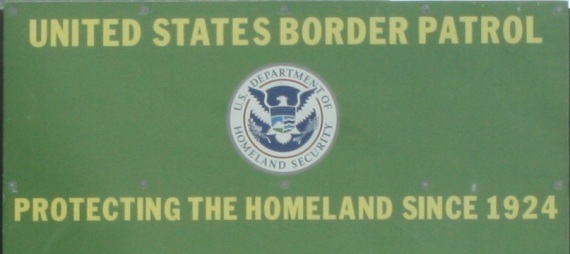Rubio Does not Want Proliferation of SB1070s
Marco Rubio doesn't want to see the proliferation of SB1070s to other states.
 From Therigthescoop: Marco Rubio: I don’t want any state adopting the Arizona illegal immigration law.
From Therigthescoop: Marco Rubio: I don’t want any state adopting the Arizona illegal immigration law.
In an interview with Neil Cavuto, Republican Senate Candidate Marco Rubio stated that while he sees special circumstances in Arizona, he is not in favor of SB1070-like bills being passed in other states. From the write-up on the interview:
He puts a very heavy emphasis on not wanting any other state to adopt that type of law though, saying that it should be the Federal governments job to enforce it. He recognizes Arizona’s special situation with a war just on the other side of the border, but stands firm in his commitment that only the Federal government should handle illegal immigration.
Interestingly, that is the basis DOJ argument in the lawsuit aimed at SB1070 (i.e., that immigration enforcement is a federal, not state, function).
I would note that Rubio, who is a darling of the conservative wing of the Republican Party (and supported by the Tea Party), had qualms about the law from the get-go and has tried to finesse the issue since then. This seems worth noting, if anything, as to point out that there are a variety of opinions on this topic, even within conservative circles. And, further, that the basic approach by the DOJ is not especially radical.
Rubio does make the claim, which I have noted before as being problematic, that the war in Mexico is “spilling over the border” into Arizona. Not only is the evidence backing that claim scant (see here and here, for example), it is yet another example of conflating the illegal immigration problem (which is fundamentally one of labor supply and demand) with the drug violence/trafficking problem, which is another issue altogether. Even if one doesn’t believe that the two issues and separate, it is difficult to see how SB1070 would have much effect on drug trafficking/drug war-related violence. It is a law aimed solely at allowing law enforcement to identify whether a person involved in a law enforcement encounter is legal or not. It is not a new and improved power aimed at drug traffickers or other violence actors. Indeed, the police in Arizona have the exact same tools to fight violent crime and drug trafficking now as they did before SB1070 was passed.
The notion that SB1070 is actually a major “public safety” action/tool for police (which Rubio claims more than once in the interview) makes no senses (although I know a lot of people seem to think that this is the case). Being able to check the immigration status of a person stopped by police for some other reason does not enhance basic public safety in and of itself, rather it simply increases the chances that someone might be deported that otherwise would not have been.
Video of the Rubio interview at the link above.
And yes, I am well aware that Rubio’s position is substantially different from the DOJ’s on SB1070 specifically (even if he ultimately is endorsing its underlying logic). I think that he is dealing with the political reality that SB1070 is quite popular nationally, and especially with the Republican base (which he desperately needs in Florida). He is also dealing with the fact that he has to deal with the fact that Florida is a state with a large number of latinos and has a significant immigrant community.





In other words he wants to have his cake and eat it. It’s ok for Republicans in Arizona to pass this bill because they are “special” but it doesn’t apply anywhere else. After all Arizona is the only state that borders Mexico.
My understanding of the DOJ’s argument is that the federal government has made an intentional decision not to enforce certain laws and does not like Arizona pointing that out ( http://www.washingtonpost.com/wp-dyn/content/article/2010/07/22/AR2010072201548_2.html?hpid=topnews&sid=ST2010072106582 : “Kneedler said the conflict with federal law comes because the status checks are mandatory, which could lead to federal agencies being overwhelmed with deportation requests. Top officials at U.S. Immigration and Customs Enforcement, whose agents will handle most of the calls from Arizona authorities if the law takes effect, have said they will not necessarily respond to every call. “). But the DOJ runs a program teeling states how to enforce federal immigration law ( http://www.cops.usdoj.gov/Default.asp?Item=2044 ).
To clarify a little, and to consider the ruling issues yesterday ( http://graphics8.nytimes.com/packages/pdf/national/20100729_ARIZONA_DOC.pdf ). From the ruling (page 10, lines 13-17): “While holding that the ‘[p]ower to regulate immigration is unquestionably exclusively a federal power,’ the Supreme Court concluded that not every state enactment ‘which in any way deals with aliens is a regulation of immigration and thus per se preempted by this constitutional power, whether latent or exercised.'” The preliminary injuction yesterday lists several parts of the law that are not enjoined (bottom of page 2 to the top of page 4) even though they interact with federal immigration laws.
Somehow I hadn’t read the section that makes it a state crime to violate a federal law (Section 3 of the Arizona law), and that section I do believe is preempted. But the other sections that were enjoined yesterday don’t look like they’re preempted, although Section 6 of the Arizona law (“authorizing the warrantless arrest of a person where there is probable cause to believe the person has committed a public offense that makes the person removable from the United States”) is close and I could understand it being enjoined.
State law cannot overturn federal law. That is the definition of preemption. For instance, state medical marijuana laws are still preempted by federal drug laws. But according to yesterday’s ruling, Section 2 of the law (which, among other things, requires state police to look into the citizenship/residency status of people arrested and refer illegal immigrants to the federal government) is preempted; not because referring illegal immigrants to federal authorities is somehow illegal under federal law because the federal authorities don’t want all those referrals. That doesn’t make any sense to me, although I have to admit the ruling finds case law support for the argument (for instance, page 16 lines 14 to 25).
Hit submit too soon. What really doesn’t make sense to me is the very next page states “Pursuant to 8 U.S.C. § 1373(c), DHS is required to ‘respond to an inquiry by a Federal, State, or local government agency, seeking to verify or ascertain the citizenship or immigration status . . . for any purpose authorized by law, by providing the requested verification or status information.’ DHS has, in its discretion, set up LESC, which is administered by ICE and ‘serves as a national enforcement operations center that promptly provides immigration status and identity information to local, state, and federal law enforcement agencies regarding aliens suspected of, arrested for, or convicted of criminal activity.'” So from a legal standpoint, Arizona has the unquestionable ability to make referrals to the feds, the only question is one of scope. I cannot understand the preemption argument under these circumstances — Arizona is required to do a preliminary check on anybody before referring them to the feds, so the burden is increased on Arizona. Any increase on the feds comes from the fact that there are in fact a large number of illegal immigrants in Arizona.